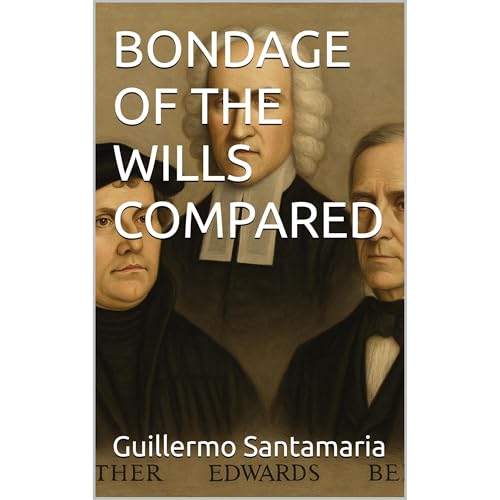
BONDAGE OF THE WILLS COMPARED
No se pudo agregar al carrito
Add to Cart failed.
Error al Agregar a Lista de Deseos.
Error al eliminar de la lista de deseos.
Error al añadir a tu biblioteca
Error al seguir el podcast
Error al dejar de seguir el podcast
 Exclusivo para miembros Prime: ¿Nuevo en Audible? Obtén 2 audiolibros gratis con tu prueba.
Exclusivo para miembros Prime: ¿Nuevo en Audible? Obtén 2 audiolibros gratis con tu prueba.Compra ahora por $3.99
-
Narrado por:
-
Virtual Voice

Este título utiliza narración de voz virtual
Puts Luther (1525), Jonathan Edwards (1754), and Old School Baptists—Absoluter wing into one frame to compare “free will,” predestination, and lapsarian order.
Moves from definitions → doctrine → exegesis → pastoral use, then closes with a source-based Beebe section.
Luther: After the Fall the will is in bondage; conversion is monergistic (God alone). Scripture’s revealed will guides preaching; the hidden will is adored, not dissected. Emphasis: Law/Gospel and assurance.
Edwards: Compatibilism—we always choose according to the strongest present motive; sinners have natural ability but moral inability to love God. Regeneration changes dispositions; God’s decree makes events certain without coercion.
OSB (Absoluter): Absolute predestination of all things; immediate (non-means) regeneration; reject “duty-faith.” Tone is supralapsarian-leaning; “permission” language is viewed as too soft—prefer decree/government while denying God is the author of sin.
Luther: Doesn’t play the lapsarian game; functionally infralapsarian if forced (elect considered as fallen), but officially sidesteps the schema.
Edwards: Infra in order (fall then election) with end-first teleology (God’s glory) that sounds supra-ish.
OSB—Absoluter: Frequently supralapsarian in tone (election/reprobation ordered to God’s prior purpose; the fall serves the plan).
Lutheran confessions: Single predestination (deny “double”); teach election for comfort and refuse a decree to damnation.
Edwards: Asymmetrical double predestination—active election; certain permission/preterition for the rest, with just condemnation for their sins (never equal ultimacy).
Absoluter OSB: Push beyond “mere permission” to absolute decree of all events (still not authoring sin). Salvation is Plan A, not a patch.
Stakes: “free will” is the hinge.
Scripture is clear on sin and grace.
Revealed vs. hidden will distinction.
“Free will” toward God is a name without a thing post-Fall.
Necessity ≠ coercion.
God ordains all; not author of sin (hardening by withdrawing grace).
Law exposes inability; Gospel creates faith.
Monergistic conversion via Word/Spirit.
9–11) Exegesis hubs: Romans 9; John 6; slavery to sin texts.Replies to Erasmus’ “middle way.”
13–15) Predestination comforts; preach Christ, not speculation.
Part I: Terms—liberty = acting from one’s own will; necessity = certainty, not force.
Part II: Will follows the strongest motive; “self-determining power” collapses into regress.
Part III: Responsibility doesn’t require leeway alternatives; it requires sourcehood (the act issues from you).
Part IV: Divine decree makes events certain; humans act voluntarily; key hinge: moral vs. natural ability.


